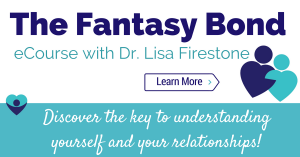7 Behaviors That Ruin a Relationship
 How can you avoid the patterns that destroy a loving relationship?
How can you avoid the patterns that destroy a loving relationship?
The question of why love fades or why people grow apart in their relationships is one of life’s great mysteries. What prevents us from maintaining the passion, attraction, admiration and closeness we once felt for our partner? What I have found in my own work and in a 30-year longitudinal study of couples and individuals is that we can contrast the patterns of behavior between couples that result in long-term romantic love with those that signify that the couple has formed a “fantasy bond.” A fantasy bond is an illusion of oneness with a relationship partner, a concept elucidated by my father Dr. Robert Firestone. When couples enter into this type of bond, they substitute a fantasy of being connected in place of real relating. They start to put form over substance, and the relationship starts to deteriorate.
The degree to which an individual in a couple enters into a fantasy bond exists on a continuum. In the beginning, people usually open up to one another and relate personally. Then, at some point, they become afraid and start to protect themselves from feeling vulnerable by shutting down and withdrawing from loving behavior. Instead, they replace real love with a fantasy of being in love, which they support by insisting on the conventional markers of a relationship. The situation can deteriorate even further until the couple no longer manifests any observable loving behavior and often expresses a lot of animosity toward each other.
 The good news is if we catch on to the behaviors associated with a fantasy bond, a subject I talk more about in a free, upcoming Webinar “Real Love Vs. Fantasy: How to Keep Romantic Love Alive,” we can begin to challenge this defense and create a more satisfying relationship. In order to truly change our relationships for the better, it’s valuable to look closely at these harmful behaviors and compare them to the more favorable ways of relating that characterize an ideal relationship. When we interrupt these patterns and actively engage in healthier ways of interacting with our partner, we’re able to feel more closeness and contentment. We can keep the spark alive in our relationships.
The good news is if we catch on to the behaviors associated with a fantasy bond, a subject I talk more about in a free, upcoming Webinar “Real Love Vs. Fantasy: How to Keep Romantic Love Alive,” we can begin to challenge this defense and create a more satisfying relationship. In order to truly change our relationships for the better, it’s valuable to look closely at these harmful behaviors and compare them to the more favorable ways of relating that characterize an ideal relationship. When we interrupt these patterns and actively engage in healthier ways of interacting with our partner, we’re able to feel more closeness and contentment. We can keep the spark alive in our relationships.
So, what are the behaviors to look out for?
1. Angry reactions to feedback vs. Non-defensiveness and openness
Communication is key to a close relationship. However, when we establish a fantasy bond, we tend to become increasingly closed off to real dialogue, that is, a kind and compassionate way of exchanging impressions and ideas. Instead, we tend to be defensive and have angry or intimidating overreactions to feedback that shut our partner down. Whether we punish our partner by breaking down emotionally, by giving them the silent treatment or by screaming at them, we’re telling them that we don’t want to hear what they have to say. We may provoke additional emotional distance by reacting critically, saying the things that we know will sting our partner the most.
In order to change this pattern, we can try to look for a kernel of truth in what our partner is saying rather than picking apart any flaws in the feedback. If he or she says, “I feel bad when you just watch TV all night. You seem distracted. I feel disregarded and like you aren’t interested in me,” we could consider what parts of that could resonate with us instead of wasting time on everything that doesn’t. We may feel like snapping back by saying, “Don’t be ridiculous and dramatic. I’m just tired!” While there may be some truth to that, we may instead pause to consider, “I have been tired lately, but is more going on with me than that? Have I been distracted to the point of disregarding my relationship?” Our attuned response would then be, “I’m sorry for you to feel bad. I’ve felt distracted lately by work and tired when I come home. I feel bad to just tune out like that. I can see how that hurts you, even though I didn’t mean to hurt you.”
We can always make it our goal to hear everything. This doesn’t mean we have to agree with what someone else is saying. However, we can strive to be open and seek feedback from people we care about and trust, so that they feel comfortable to talk to us about the more difficult subjects.
2. Closed to new experiences vs. Open to trying new things
In every relationship, it’s important to maintain a sense of ourselves as a unique person. When we get involved with someone new, it should expand our world, not shrink it. When we first fall in love, we tend to be open to new things. However, when we start to engage in a fantasy bond, we tend to adopt roles and routines that limit us and close us down to new experiences. We may become more rigid and automatic in our responses. “You know I don’t like that restaurant.” “We always see a movie on Saturday night.” It actually hurts the relationship when we stop being free and open to developing new shared interests. It can foster real resentment between partners. While no one should force themselves to do things they really don’t want to do, shutting down the part of ourselves that seeks new experiences and responds to a spark in our partner can drain us of our aliveness and spontaneity.
We should always be open to exploring things that expand our world and be careful not to limit our or our partner’s experience. We can try activities each of us likes and see if they add to our arsenal of things we can do together and share in a lively way. This doesn’t mean that we have to share all of our interests or meet every one of each other’s needs. In fact, it’s essential to maintain our independence and individuality. We don’t need one person for fulfillment, but we do need some shared activities. A relationship doesn’t exist in a vacuum. Being open to new experiences keeps it alive.
3. Deception and duplicity vs. Honesty and integrity
Most of us know from experience that we can drive each other crazy when our words and actions fail to match. Unfortunately, deception and duplicity are pretty common in relationships. There are a lot of mixed messages based on saying one thing and doing another. Examples include:
Saying “I really love you,” but acting like I don’t have any time to spend with you.
Saying “I want to be close to you,” then constantly criticizing you when you’re around.
Saying “I’m not interested in other people,” but flirting with everyone else at the bar.
The actions that contradict these words do not look like love. They represent a fantasy of being close but without real relating, essentially putting form over substance. Double messages like these mess with another person’s reality, which can actually be considered a basic human rights violation, not to mention a huge threat to lasting, loving relationships.
Admittedly, honesty in a relationship can be tricky, because it doesn’t mean saying every little critical thing to our partner that pops into our head. We have to know our real intentions and what our real truth is. This means we have to know ourselves. We have to consistently ask ourselves, “Am I being honest? What’s my motivation? Do my words and actions really match?” If we say we really love someone, there should be actual actions we take toward them that, to an outside observer, would be viewed as loving. Are we affectionate to them? Do we talk to them? Do we light up when they come around? When our actions are honest, we can create genuine closeness.
4. Overstepping boundaries vs. Respect for the other’s boundaries, priorities and goals
In a fantasy bond, couples tend to overstep each other’s boundaries and form a fused identity. They start to see themselves as a WE, instead of a YOU and ME. “WE like to go there.” “WE don’t want to go that party.” “WE like that kind of food.” Many of us unintentionally lose track of where we leave off and our partner begins. Without even noticing it, we may be intrusive or controlling toward our partner, acting in a manner that is disrespectful or demeaning to the other person’s sense of self. When this happens, it not only hurts our partner and his or her feelings for us, but it can undermine our own strength and our feelings for our partner. Many couples come to hold their partner responsible for their happiness, leading to demands and complaints and a sense of powerlessness.
In order to be a loving partner and maintain our own feelings of interest and attraction, we should have regard for what lights our partner up and matters to him or her. We should see our partner as a whole and separate person who matters to us, independent of our own needs and interests. We can both encourage each other to engage in pursuits that really express who each of us is individually. Whether it’s learning a language, climbing a mountain or writing a book, we can see each other for who we really are and support each other’s unique goals and capabilities. When we give another person this space, regard and respect, we actually draw that person closer to us, as we can both really feel for each other as the true people we are.
5. Lack of affection and inadequate, impersonal, or routine sexuality vs. Physical affection and personal sexuality
In a fantasy bond, there can often be a lack of personal relating and, often, a lack of affection. The sexuality can start to feel inadequate, impersonal or become hardly existent. Some couples describe their sex lives as becoming mechanical or highly routinized. This takes much of the excitement out of their attraction. Obviously, there are real outside circumstances that can affect or change one’s physical relationship. However, there’s often also a lot of negative self-talk or “critical inner voices” that discourage us from pursuing our sexuality. It’s important to filter out the negative messages and stay in touch with this vital part of ourselves and our partner. Ideally, we would strive to stay in touch with our own wanting feelings and with those of our partner. There would be a give and take, with real contact being made, that sparks intimate and loving feelings between the two of us. The more free flowing and spontaneous our expressions of love can be, the less likely we are to grow apart.
6. Misunderstanding vs. Understanding
In a fantasy bond, we tend to see our partners for who we need them to be rather than who they are. We may distort them by idealizing or putting them on a pedestal. Or, we may pick them apart, denigrating them by projecting negative qualities onto them. We may even see them as more critical, intrusive or rejecting than they are, because we grew up with people who had these qualities. When we disrespect the boundary between ourselves and our partner, we’re more likely to see them as an extension of ourselves, and we may mistreat or criticize them in ways we mistreat or criticize ourselves.
In an ideal relationship, we try to see our partner realistically, both with their strengths and their foibles, and accept them for who they are. We don’t allow ourselves to create a negative caricature, which means not focusing in on their flaws and indulging in critical thoughts. However, it also means not creating a grandiose image of them. No one can really feel loved unless they feel seen realistically. When a partner is either building us up or tearing us down, we can feel like we’re on shaky ground, not really being loved for who we are. This is why it’s so important not to distort the other person.
7. Manipulations of dominance and submission vs. Noncontrolling, nonmanipulative and nonthreatening behaviors
Because of people’s own defenses and desire to protect themselves, it can be easy for couples to play games and be indirect about their wants and needs. They may engage in manipulative maneuvers to get what they want, like trying to control a situation by crying and falling apart or blowing up and being intimidating. They may also adopt roles that hurt or limit them in their relationship. For example, couples often polarize each other, with one person becoming domineering and controlling, while the other acts passive and submissive. This may take different forms in different aspects of the relationship. One partner may be seen as the “boss” of finances; another may be the one who controls the sexuality between them. They may be drawn to assuming certain roles out of familiarity or as a way to feel secure, however this actually undermines their ability to relate as two equal individuals.
In an equal relationship, it’s important to ask directly for what we want and need from each other. This gives our partner an opportunity to respond and meet our needs. Many of us make the mistake of expecting our partner to read our minds and “know” what we want, which can only lead to disappointment. It’s important to say what we want without trying to dominate or control the situation. We usually feel vulnerable when we’re open about who we are, what we want and how we really feel. Yet, this directness is the best way to maintain an honest and authentic way of relating and get what we want in life.
By being aware of all of these behavior patterns that contribute to relationship distress, we can hold ourselves to a standard of remaining both true to who we are and sensitive to another person. We can encourage an atmosphere of love and support, while maintaining the unique, individual qualities that drew us to each other in the first place. We can avoid the traps of a fantasy bond and enjoy the raw and real adventure that is a loving relationship.
Learn how to break free from a Fantasy Bond in our eCourse, The Fantasy Bond: The Key to Understanding Yourself and Your Relationships
About the Author
Related Articles
4 Comments
Leave a Reply
Understanding and Preventing Teen Suicide: CAMS-4Teens™ as an Effective Treatment Approach
Learn MorePopular Posts
- Is Being Proud of Your Kids Really about You?
- Psychalive - Psychology for Everyday Life
- Things I Wish I Was Told When Diagnosed With Depression
- The Polarized Mind: Humanity’s “Great Mistake”
- 3 Things to Do the Minute You’re Overwhelmed With Anger
Related Articles
-

- Can an Open Relationship Actually Work?
-

- Keep Love Strong This Valentine’s Day and Beyond
-

- In a Relationship with a Narcissist? What You Need to Know About Narcissistic Relationships







WOW! Dr Firestone, you just described my wife. In “7 Behaviors That Ruin a Relationship”, my wife has every behavior minus #2. I don’t know what to say, OMG! I love her deeply and have been very patient and kind but right now I feel like running. Wow! Lord help us! Thank you for you article. (Eagle Rock, Ca)
How about you worry about the behaviors YOU need to improve!! If you STOP judging HER and concentrate on YOURSELF, i bet YOUR wifes unacceptable behaviors will disappear!!
It could also be due to a personality disorder(BPD), as my wife has. Mine exhibits these also. Just because someone states a fact does not mean they are judging.
Wow this article was very informative in so many ways that I could have never even imagined. Thank you because I have been feeling so lost and confused in how my husband and I could at one time be open and honest and now it’s horrible. This has opened my eyes to see that it’s not just me or him but both of us in our own ways. I can’t say thank you enough I thought I was losing my mind, I am going to share this article with him in hopes he to gets the ah ha moment I did to change our individual selves.